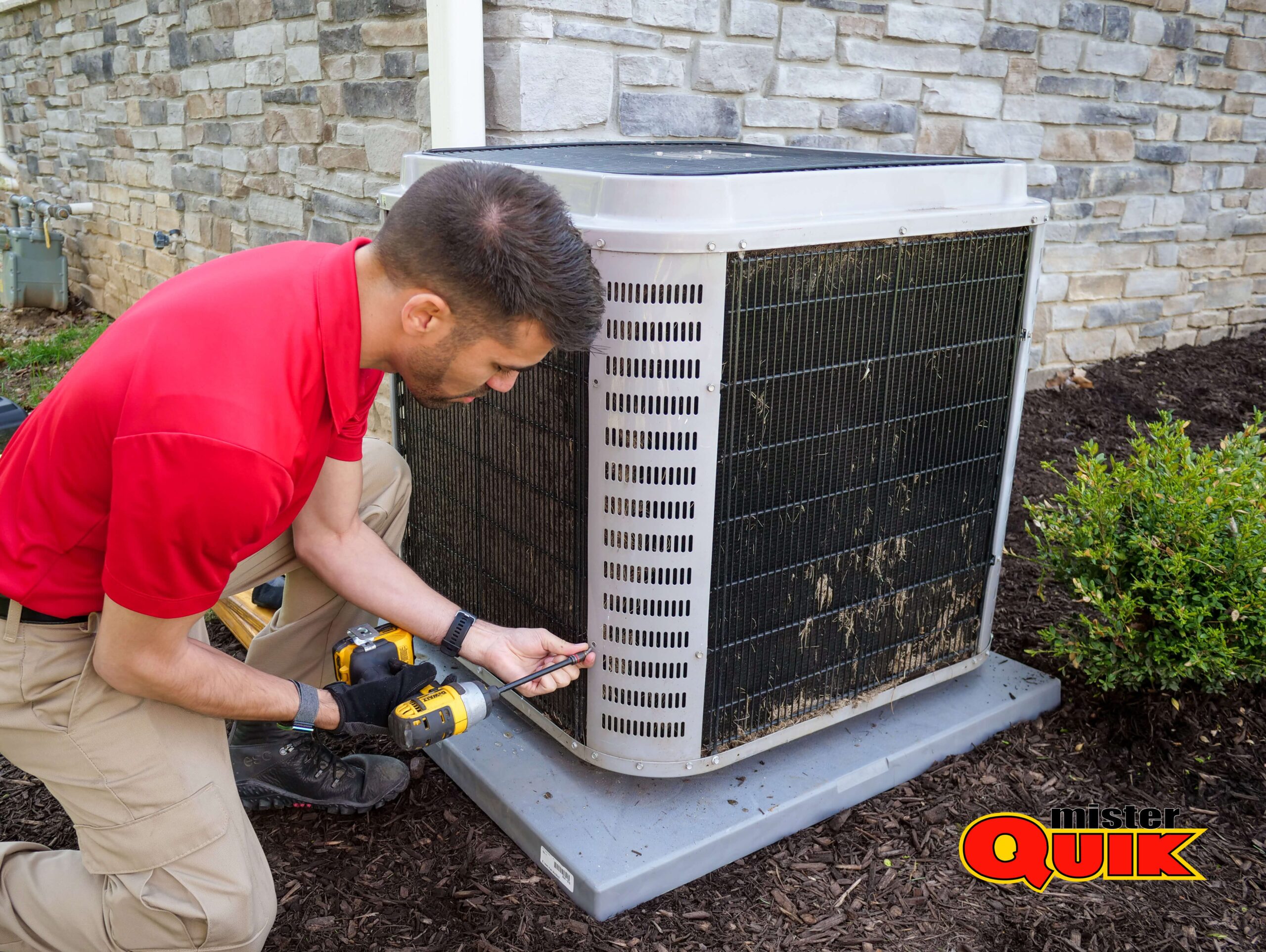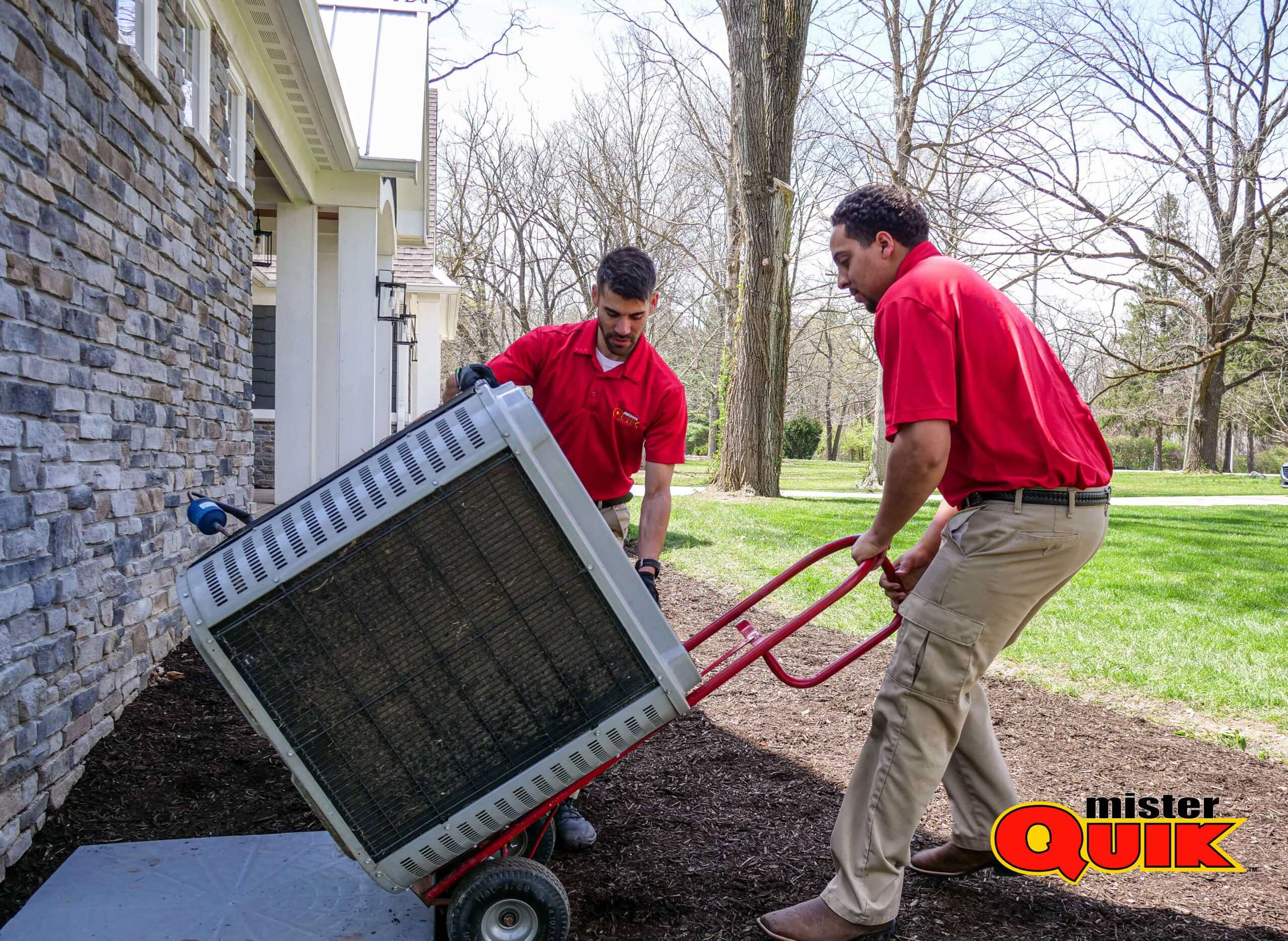Cooling Replacement in Fishers
Schedule on your own without making a call. Click the button below to get started!

Best Cooling
Replacement in Fishers
When it comes to finding the best cooling replacement service in Fishers, you want to ensure you’re getting comprehensive assistance to keep your home comfortable. Here’s what you can expect from a top-notch cooling replacement service:
- Professional Assessment: Experts will evaluate your current cooling system to determine if replacement is necessary.
- Customized Solutions: Tailored recommendations based on your home’s size, cooling needs, and budget.
- Efficient Installation: Skilled technicians will handle the installation process swiftly and accurately.
- Quality Equipment: Utilizing high-quality, energy-efficient cooling units for optimal performance.
- Thorough Testing: Testing the new system to guarantee it’s functioning correctly before completion.
- Clear Guidance: Providing clear instructions on operating your new cooling system efficiently.
- Warranty Coverage: Assurance with warranties on both equipment and labor for peace of mind.
- Responsive Support: Access to reliable support for any post-installation inquiries or issues.
- Enhanced Energy Efficiency: Enjoying improved energy efficiency and lower utility bills with a modern cooling system.
- Increased Comfort: Experience enhanced indoor comfort with a properly functioning cooling replacement.
When seeking the best cooling replacement in Fishers, prioritize a service that encompasses these essential elements for a hassle-free experience and a cooler, more comfortable home.
Heating and Cooling Replacement Cost
When facing Cooling Replacement needs, understanding the associated costs is crucial. Several factors influence the overall expense, ensuring you’re prepared for what lies ahead. Here’s what to consider:

Different cooling systems come with varying price tags. Whether it's a central air conditioner, ductless mini-split, or heat pump, each has its own cost range for replacement.

The size of your home and cooling needs dictate the size of the replacement unit. Larger units generally cost more due to increased capacity.

Opting for a higher efficiency unit might mean a higher upfront cost but could result in long-term savings on energy bills.

Factors like accessibility, complexity of installation, and any necessary modifications to ductwork or electrical systems can impact the overall cost.

Consider any additional components required for installation, such as thermostats or air purifiers, which can add to the total cost

Installation labor costs vary based on location, contractor rates, and the complexity of the job.

Longer warranties may come with higher upfront costs but can provide peace of mind and potential savings on future repairs.

Check if your area requires permits for cooling system replacement, as this can add to the overall cost.
The cost of replacing a cooling system in a house varies based on factors such as the type of system being installed, the size of the house, the complexity of the installation, and any additional upgrades or modifications required. On average, homeowners can expect to pay anywhere from a few thousand dollars for a basic replacement of a window unit or ductless mini-split system to several thousand dollars for a complete replacement of a central air conditioning system or geothermal heat pump. It’s recommended to obtain quotes from multiple HVAC contractors to get a more accurate estimate based on your specific needs and circumstances.
You can identify potential issues with your cooling system by noticing signs such as reduced cooling performance, unusual noises or odors, poor airflow from vents, frequent cycling on and off, visible leaks or moisture, or ice buildup on components. Additionally, if you experience a sudden increase in energy bills without an increase in usage, it could indicate inefficiencies or malfunctions within the system. Observing these symptoms suggests that your cooling system may require maintenance or repair to address underlying issues and ensure optimal performance.
The lifespan of a cooling system varies depending on factors such as the type of system, how well it’s maintained, and how frequently it’s used. On average, a well-maintained central air conditioning system can last anywhere from 10 to 15 years. Factors such as regular maintenance, proper installation, and using the system within its intended capacity can help extend its lifespan. However, eventually, wear and tear will accumulate, leading to decreased efficiency and the need for replacement. Regular maintenance and prompt repairs can help maximize the longevity of a cooling system.
The best cooling system for a house depends on various factors including the climate, the size and layout of the house, energy costs, and personal preferences. Central air conditioning systems with high SEER ratings are often considered efficient and effective for cooling larger homes with existing ductwork. However, ductless mini-split systems offer flexibility and zoning control, making them suitable for homes without ductwork or for room additions. Geothermal heat pumps provide high efficiency but require a significant upfront investment. Ultimately, the best cooling system choice will depend on individual needs and circumstances
The most cost-effective cooling solution for a home depends on factors such as climate, house size, and energy costs. High-efficiency window units or ductless mini-split systems can offer cost-effective cooling for smaller spaces or individual rooms, providing flexibility and energy savings compared to central air conditioning systems. Consulting with an HVAC professional can help determine the most cost-effective cooling solution tailored to your specific needs and circumstances.
Cooling Replacement Cost
When facing the need for Cooling Replacement, managing costs becomes paramount. Here are some tips to help bring down the expense while ensuring efficient cooling:


- Research and Compare: Spend time researching different cooling systems and their costs. Compare prices from multiple providers to find the best deal for your budget.
- Energy Efficiency: Opt for a cooling system with a high energy efficiency rating. While it may have a higher upfront cost, it can lead to long-term savings on energy bills.
- Negotiate with Contractors: Don’t hesitate to negotiate with cooling replacement contractors. Ask for discounts, inquire about any ongoing promotions, or see if they can offer a lower price for a specific model.
- Explore Financing Options: Look into financing options available for cooling replacement. Many providers offer flexible payment plans or loans with low-interest rates, spreading the cost over time.
- DIY Preparation: While installation should be left to professionals, you can reduce labor costs by preparing the installation site yourself. Clearing the area and ensuring easy access can streamline the process.
- Regular Maintenance: Once the new cooling system is installed, prioritize regular maintenance to ensure it operates efficiently and lasts longer. This can help prevent costly repairs down the line.
AC Replacement Cost
When facing the need for AC Replacement, it’s essential to gather all necessary information to ensure an accurate quote. Here are some key questions to ask when seeking a quote for Cooling Replacement:


When facing the need for AC Replacement, it's essential to gather all necessary information to ensure an accurate quote. Here are some key questions to ask when seeking a quote for Cooling Replacement:
Type of AC Unit: Determine which type of AC unit is suitable for your space, whether it's a central air conditioner, ductless mini-split, or heat pump.
Size and Capacity: Understand the size and capacity requirements for your home or space to ensure the new AC unit effectively cools the area.
Energy Efficiency: Inquire about the energy efficiency ratings of different AC units and how they impact the overall cost and long-term savings on energy bills.
Installation Costs: Ask about the breakdown of installation costs, including labor, materials, and any additional components required.
Warranty Coverage: Clarify what warranty coverage is included with the AC unit and installation services, including any extended warranty options available. Permit Requirements: Check if permits are required for AC replacement in your area and whether the contractor handles the permit application process. At Mister Quik, we handle the permit process, so you don't need to worry!
Cheapest Way to Replace HVAC System
When considering Cooling Replacement, finding the most cost-effective option is crucial. Here are some tips for achieving the Cheapest Way to Replace an HVAC System:
1.Energy Efficiency
Look for HVAC systems with high energy efficiency ratings. While they may have a slightly higher upfront cost, they can result in significant long-term savings on energy bills.
2. Research and Compare Prices
Spend time researching different HVAC systems and comparing prices from multiple providers. Look for discounts, promotions, or clearance sales to find the best deal.
3.Consider Refurbished Units
Explore the option of purchasing a refurbished HVAC unit. These units are often significantly cheaper than brand new ones and can still provide reliable cooling.
4.DIY Preparation:
Prepare the installation site yourself to reduce labor costs. Clearing the area and ensuring easy access for the installation team can help streamline the process.
5.Negotiate with Contractors:
Don’t hesitate to negotiate with Cooling Replacement contractors. Ask for discounts, inquire about any ongoing promotions, or see if they can offer a lower price for a specific model.
6. Explore Financing Options
Look into financing options available for HVAC replacement. Many providers offer flexible payment plans or loans with low-interest rates, spreading the cost over time.
7.Regular Maintenance
Once the new HVAC system is installed, prioritize regular maintenance to ensure it operates efficiently and lasts longer. This can help prevent costly repairs down the line
By implementing these strategies, you can replace your HVAC system in the most cost-effective way possible while still ensuring reliable cooling for your space.
AC Installation Cost
When considering Cooling Replacement, understanding the AC Installation Cost is essential for effective budgeting. Here’s what you need to know:
Determine which type of AC unit is suitable for your space, whether it's a central air conditioner, ductless mini-split, or heat pump, as each comes with its own installation cost.
Assess the size and capacity requirements for your home or space to ensure the new AC unit effectively cools the area without overspending on a unit that's too large.
Inquire about the breakdown of labor costs for AC installation, including any additional charges for complex installations or modifications to ductwork.
Ask about the cost of any additional components required for installation, such as thermostats, air purifiers, or programmable controls
Consider investing in energy-efficient upgrades during installation, which may have a higher upfront cost but can result in long-term savings on energy bills.
Check what warranty coverage is included with the AC unit and installation services, as well as any extended warranty options available for additional peace of mind.
Determine if permits are required for AC installation in your area and factor in any associated costs for permit application and approval.
By considering these factors and asking the right questions, you can better understand the AC Installation Cost and make informed decisions when replacing your cooling system.
All four guys were ‘gentlemen’ and well/skilled. Cleaned-up after themselves! Had ducts sealed and black light installed over condenser coils; expensive but done well.., always reliable. I have been a ‘preferred’ customer for 23 years and have only used Mr. Quick on HVAC... Read more
Marcus was our technician who came out and he was so friendly and professional. He made sure to provide us with all of the information was needed as far as the problem, solution, financing, etc. he even showed us pictures of what a water heater install looks like so we’d know... Read more
They came in on time to my warehouse to work on a tankless heater. Charged me just the flat rate for the job that they said they would be doing and nothing else. Justin was super friendly and professional. 10/10 highly recommend.
I had gotten a referral from Duke energy for this company for help in replacing my central air. From the initial call with the young lady on the phone to the young man Brandon Roe that came to do my assessment the same day I felt like I was listened to. Brandon took his time... Read more
We requested a free estimate for electrical work and James Schultz came out. He was very professional, friendly, knowledgeable and thorough. We appreciated his attention to detail and the solution he provided. Great first impressions of this company!
I was dealing with plugged drains for 3 days along with a plumber and septic service with no results. As soon as I called MrQuik, they arranged for someone to come out within an hour. Their Technician did a wonderful job and had everything cleared out right away. I highly... Read more
Issac and Christian were very helpful and informative when diagnosing the problem with our dining room light. They narrowed down the issue and took care of it. Both were very respectful and a pleasure to work with. Will be reaching and requesting them next time we need any... Read more
James C was amazing and his crew.. he made sure and cleaned up after all his work.. He went above and beyond.. He even greeted us every morning. He is one awesome and kind person to be around and made lots of funny jokes. He always had a smile on his face everyday. Thank you... Read more
Very pleased with their promptness and customer service. I’ve never had such good response and customer service from a plumbing company. They treated my plumbing issue with urgency and care. Highly recommend. I will use for all my future plumbing needs.
The HVAC team of Brad and Justin that was sent to my house today were fast, friendly and respectful. They arrived on time and didn't stop until the job was complete. They even greated out family dog. They were a pleasure to have in our (now thanks to these guys) warm house... Read more
So the technicians Joe Milano, and his partner Josh, had came earlier and fix the toilet. But an hour after they left it started messing up again. So I called back, and they came right back out here and worked on it even longer, and it's working good now. They went the Extra... Read more
I want to say James the manager and his crew are very professional and thorough when it comes to doing electrical work, I highly recommend those guys for a pay raise or some kind of recognition for their professionalism in the work they did. I can't express enough gratitude... Read more
What a great company! Fast, professional, courteous and a pleasure to work with. I’ve found my local business for plumbing electric and HVAC going forward. Was able to reach someone immediately when I called. From the time I called to the first visit was less than a day. It... Read more
Noah was great to work with and really helped us out when we needed something urgently. He kept us informed on what needed to be done, but would check with us first before doing any kind of work. The work was done quickly and would recommend to anyone!
I had the pleasure of having Mr Quick out my Home today for my yearly furnace check up. Brandon was here early and efficient and through with his inspection and his explanation of what he found. Was clear with his recommendations and quick to install the product that would... Read more
David Lawson came out to our home yesterday and he did a fantastic job explaining things and putting our mind at ease. Buying a furnace and AC is very stressful. David made sure we understood everything and explained every option available to us. Thank you for taking time out... Read more
We have contracted Mister Quik for work needed, a few times over the last year. For today’s job, Technicians Jacob and John were very patient and helpful in answering all my questions regarding the work repair / needed options. They also helped me with pricing. Strongly... Read more
We had our water heater replaced a few months ago and decided to sign up for the annual membership at that time. This covers hvac and water heater check ups for free and repairs at a discounted price. Even though we had our hvac replace by a separate company 2 years ago, they... Read more
Same day service for clogged kitchen drain. Gentleman that took my call was very nice & helpful. The 2 technicians that came were very clean, professional, & did a very good job. They also left everything spotless when they were done. Will definitely call them again!
Caleb Courtney was the electrician who came out today. And I'm glad he did! Had another electrician out who could not and did not solve the issue. Caleb diagnosed the problem and will return tomorrow to do work to solve it and improve house electrical for safety. He was... Read more
As a homeowner for over 20 years, I have used a number of different service providers - some outstanding and others downright awful. Mister Quik is probably among the top 3 that I have ever dealt with. My dryer reported that the vent duct was 80% clogged. I searched for dryer... Read more
I had a wonderful experience. I received same day service and everyone I spoke with had exceptional customer service. My technician Donnie was extremely knowledgeable and demonstrated incredible professionalism. He did an outstanding job and made certain to explain everything... Read more
Last night our A/C went out. After a hot night and even hotter day (78 inside) we called multiple companies waiting for a response on a Sunday. No one called back or responded. My husband finally called Mr. Quick. They were professional, didn’t charge us a service fee to come... Read more
Called Mr. Quik for what I originally thought would be a simple plumbing/sewer issue. It turned out to be far more expansive than I realized. My experience was largely great! Mr. Quik did all of my diagnostics free of cost. All in all I was told the project, once started... Read more
Troubleshoot Checklist:
- Check if the current cooling system requires replacement.
-
-
- Look for signs of inefficiency or frequent breakdowns.
-
- Determine the estimated cost for Cooling Replacement.
- Research and compare prices from multiple providers.
- Identify the suitable type of cooling system for your space.
- Consider the size and capacity requirements for effective cooling.
- Opt for a cooling system with high energy efficiency.
- Explore energy-efficient upgrades to reduce long-term costs.
- Prepare the installation site to streamline the process.
- Inquire about labor costs and any additional components needed.















